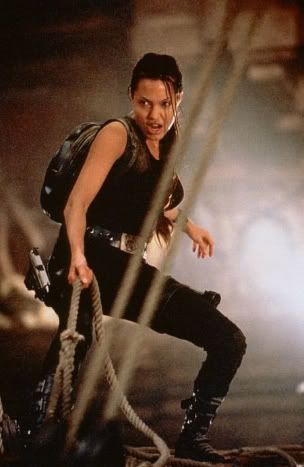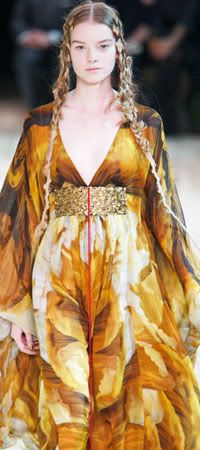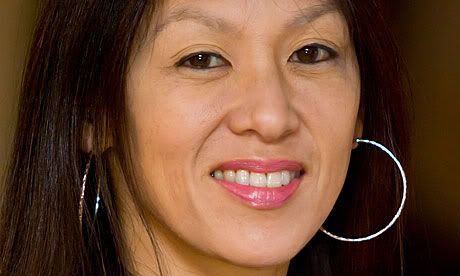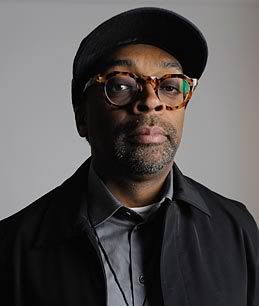This unflattering portrayal of author Amy Chua
is posted in the the British leftist newspaper the Guardian
The paper labels the image with a quote from Chua's book Battle Hymn of the Tiger Mother:
"The solution to substandard performance is always to excoriate, punish and shame the child"
Incriminating imagery of a Western-culture denouncing non-white in a leftist newspaper? Chua is too much even for the Guardian.----------------------------------------------------------------------------------
[Cross-posted at Camera Lucida]
I've noticed (and noted) a strange sinophilism going around these days. It doesn't matter if it is a left-wing or a right-wing commentator, the consensus seems to be that the Chinese (culture, at least) has got it right. One of these manifestations is the white male/Chinese female coupling I see all around me, which I've discussed
here. In another post I discuss how
Janice Stein, a University of Toronto academic who often appears on news shows as a political expert, excuses China's draconian measures towards its own work force by saying "that's the only way things can get done." Such behavior apparently translates down to family interactions, where Amy Chau, a Yale University law professor discloses her harsh intimidation methods to get her daughters to achieve "perfection" in her memoir
Battle Hymn of the Tiger Mother.
I skimmed through a book review of
Battle Hymn of the Tiger Mother in the January 2011 issue of Elle Magazine, but lost interest (or more like rolled my eyes), and stopped reading after the introductory paragraph:
A hyperachieving law prof and author from a cosmopolitan Chinese clan lays out a fearsome child-rearing philosophy.
Another Amy Tan type of book glorifying abusive Chinese mothers, I though.
Steve Sailer, from the anti-immigration website Vdare, which purports to eschew Western values, has posted a blog
praising Amy Chau, and her draconian mothering and child-rearing techniques.
Sailer quotes from the New York Times review of Chua's memoire
Battle Hymn of the Tiger Mother:
“In retrospect, these coaching suggestions seem a bit extreme,” she writes in the book after describing how she once threatened to burn her daughter’s stuffed animals if she did not play a piano composition perfectly. “On the other hand, they were highly effective.”
In interviews, she comes off as unresolved. “I think I pulled back at the right time,” she said. “I do not think there was anything abusive in my house.” Yet, she added, “I stand by a lot of my critiques of Western parenting. I think there’s a lot of questions about how you instill true self-esteem.”
Sailer adds a one-line comment:
One thing you can say for Ms. Chua is that she’s got guts.
Guts to bully and intimidate her children into becoming classical pianists?
Battle Hymn of the Tiger Mother is getting complementary reviews in many other venues.
- The Wall Street Journal ran an
excerpt from Chua's book in early January. And allowed her to rebut the many negative comments she got from readers. Rather than write their own review, the editorial group at WSJ simply left the floor open to Chua. This is not a book review, but an underhanded way of giving a book a "pass".
- The
reviewer from Macleans magazine from Canada, a spineless Joan Latmer writes, "I can’t think of a better rehab warden than Chua. The smart money’s on Tiger Mother."
- The Globe and Mail's Margaret Wente goes all out and
praises non-white, non-Western parenting techniques which border on child abuse. Here's what she says about Andre Agassi's Iranian father training techniques:
Mike Agassi, a first-generation immigrant from Iran, taped Ping-Pong paddles to his son’s hands when he was just a toddler. At 6, Andre was practising four or five hours a day.
Agassi later confessed that he’s always hated tennis “with a dark and secret passion.”
Wente writes about Chua:
Instead of false praise, [Chua] believes in high standards and criticism. She once rejected a hastily scrawled birthday card that one of her daughters had made for her. “This is garbage,” she said. “You can do better.”
The snarky Wente continues:
Cruel? Maybe. But her older daughter, Sophia, has already played at Carnegie Hall. Your children probably haven’t.
Yes, anything to glorify the glorious non-West, and demonize the West, for these leftist Globe and Mail writers.
Chua relaxed her draconian methods and let her younger daughter give up piano for tennis. But, it's not necessarily generosity (or motherly love) that made her cede, but simply that she couldn't squeeze enough talent out of her unobliging daughter. Instead, she seems to have focused her classical-pianist-for-a-daughter needs on the eldest daughter.
But so far, Chua's promising older daughter has only played
once at Carnegie Hall, and she's already eighteen. She's placed high in a couple of parochial competitions: second in a piano competition in the Greater Bridgeport Symphony competition for young musicians in 2010, and first at the Music Teachers National Association piano competition in 2006. She is no child prodigy, and might turn out to be a competent pianist, and end up in her mother's alma mater as the next best thing to a performer - a music teacher.
Part of the joy of perfecting something is because one loves it, or is encouraged to love it. Grueling practice sessions, time away from friends and play, and overcoming jittery nerves before performances are then usually worth the effort. I would wager that artists are willing to spend years of financial and social insecurity because they love their craft, and are willing to sacrifice other comforts to express that love. They could not function with a stick waving above their head.
When I was started to study ballet at a young age, I was so scared of my teacher (a Bulgarian communist who would tap my knee with a stick - "your k-nee, Kidist, your k-nee) that I failed miserably and was further humiliated at being removed from a school pageant. Yet later on, while a slightly older girl in the British school system, my teachers commended my grace (I also won a third-place prize at a local, regional competition). Later still, I joined many other dance groups, including a Mexican folk dance group often as a partner to the dance instructor/leader, an American modern dance ensemble where audience members would search for me to give me compliments, and even a belly dance group (I quit that one finding
little art in it). I even organized and choreographed small groups for dance performances in college.
I never became a dancer, since I didn't have enough talent, and who knows what other social reasons excluded me from this art (including an emphasis on academics rather than the arts in my family), but I was never that incompetent young girl doing plies at the mercy of a teacher's stick. And many generous teachers instilled in me a love of dance which effaced the memory of the stick, and allowed me to continue to be thrilled by it all my life. I decided to enter an art-related field, and sometimes use music and dance (pattern) analogies to "compose" my work. Relying on that stick would have killed all of that.
Chua's unobliging daughter chose tennis for her second chance at doing something well. It is interesting that the similarity between her music and her sport is not that the fields are related, but that they are very different. Yet, there is an abstract, psychological similarity between the two (or at least the way Lulu Chua interacts with them). Competition seems to be the overriding factor, to "play" and win. Perhaps it was in her nature to be athletically competitive, and piano playing couldn't give her that. But, perhaps her mother's draconian (evil) methods that art is associated with pain, and even hate, simply clinched her decision.







